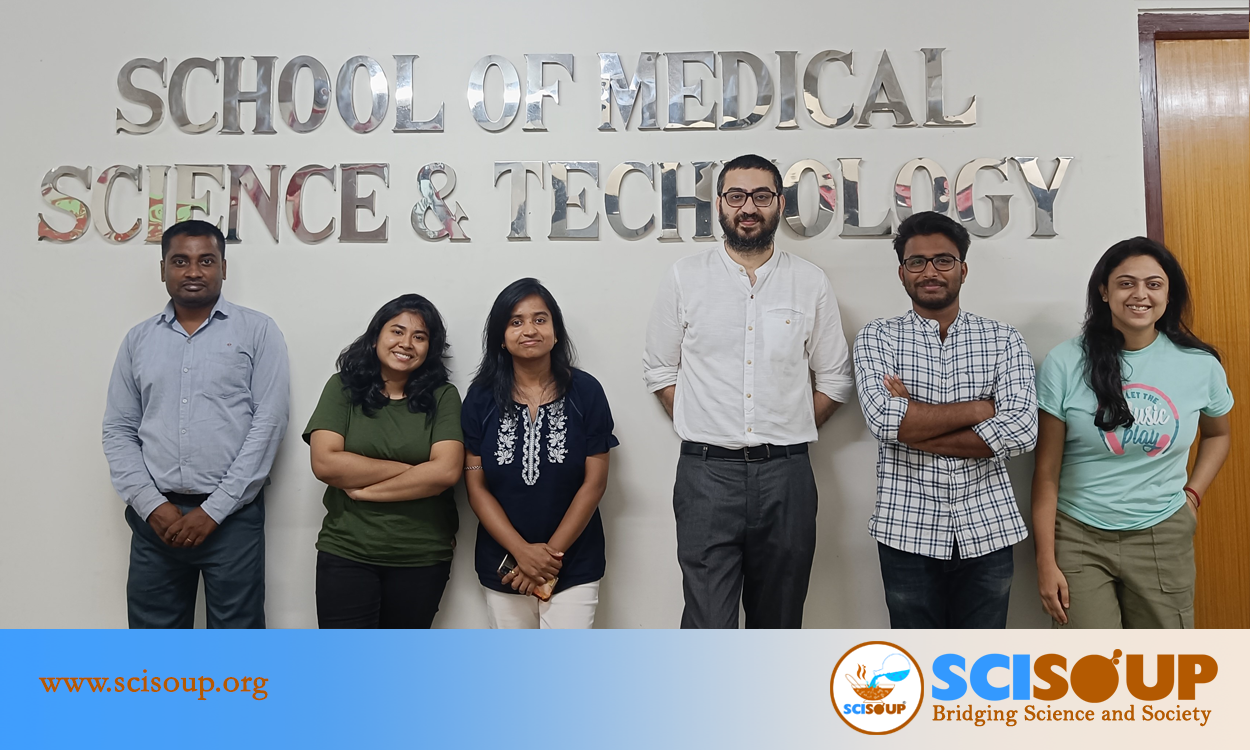
Embarking on an independent scientific journey as an academician heading an independent research group with teaching responsibilities comes with a set of unique challenges. Each person has a unique way of navigating this path. The background preparation and strategies one employs to get into an academia based position are also varied. As a part of SciSoup Blog Series, we have tried to collate a questionnaire that various young investigators and early career researchers have responded to and we hope that this brings in new perspectives, ideas and helps aspiring young researchers who are planning to take this path and embark on this exciting journey ahead.
NOV 16, 2022 | BY ROHAN J. KHADILKAR
In this mentoring Blog post, we would be sharing with you the views and experiences of Dr. Budhaditya Mukherjee from Indian Institute of technology (IIT), Kharagpur. Budhaditya Mukherjee completed his Ph.D. from CSIR-IICB, Kolkata, India in 2014. After his Ph.D., he joined the John Hopkins Bloomberg School of Public Health, USA, for a short Post Doctoral stint. Soon after, he received EMBO Post Doctoral Fellowship and joined the University of Geneva, Switzerland. During his Post Doctoral research in Geneva, from 2015-2019, he worked on Apicomplexan parasites, Plasmodium and Toxoplasma. He joined IIT Kharagpur in June 2019 as an Assistant Professor in the School of Medical Science and Technology. His group is interested in understanding key components of drug-resistant pathogens infection which might offer a selective survival advantage and promotes widespread drug resistance.
1) How was the transition like from being a postdoctoral fellow to an independent investigator and leading a research group?
No transition in life is without any hurdles. It took some time for me to adjust to the role of PI, and it's still a continuous ongoing process. Every day I learn something new from my students who visit me with questions I haven’t faced before. As a young PI, I have to learn how to motivate my students when I see them with dropped faces standing over their failed experiments. I have learned to enjoy every little moment when they announce their first clone or have their first transfection. I have started to realize that it's not only about doing only experiments anymore but it’s also about making sure my Ph.D. students can learn every aspect of research life. I always try to support them even in the "experiments of daily life" which in my view are sometimes essential for a successful research experiment. For instance, I have seen PIs renting rooms for their Ph.D. scholars during the pandemic so that it becomes a little easier for them to carry on their Ph.D. work when hostels were vacated. I feel sometimes a PI working in an Indian setup might have to do a bit more to support their PhDs which is not always a necessary component in a western setup.
2) What advice and tips you would provide to a person who is planning on transitioning to academia and is on the academic job market?
1. Start your application process early (particularly if you are looking for a position in India) 2. It’s better to reach out to the department you are applying for, to know if they are looking for someone with your expertise. A formal application followed by an email to HOD or anyone in the department with some overlapping research domain might help a lot. This helped me a lot as the application procedure takes a long time to process and often during this time I have received emails from HODs or some senior professors from the department which have inevitably indicated that they are considering my application.
3) What are some of the specific challenges you faced while setting up your own lab and starting a new research group?
Having very limited exposure to the administrative part before starting as an independent PI is probably the most common challenge that most of us face. Adjusting to this new role of purchase officer, chief engineer, interior designer, building planning, etc, and trying to make sure all these events are coordinated and happen within a logical time frame has been something I am still trying to expertise. Probably the greatest challenge was learning the purchase process through GeM which would somehow allow me to buy exactly the specific material that I am looking for. It still remained a challenge to this day! I have immensely benefited from several "off-the-book advises" on how to maneuver through these tedious processes which I often received from visiting my senior colleagues.
4) Which are some of the fellowships/grants that an early career researcher in India can apply for in order to kick start their career?
It's better if the institute provides some seed funding. DST-SRG is one funding that all early career PIs should think of applying for immediately.
5) Your thoughts on teaching, mentorship and its role in shaping curious minds?
It's refreshing and it's a great learning process. In my view, these interactions not only help to shape the mind of students but also the PIs. For instance, during the pandemic season, I have learned better ways to do bioinformatics analysis from my students. It is amazing to see that these young minds with strong mathematical and programming knowledge can be involved in biological problems often providing a fresh perspective that has immensely benefited the lab so far. I do perform extensive teaching after joining IIT-Kharagpur, and my advice to a post-doc who might soon have to take up the challenge of teaching the best minds of India will be to prepare yourself. I always make an effort to prepare myself before teaching my class and in my personal experience I have found out that students enjoyed blackboard teaching more than slide-based teaching. However, the key to a successful and enjoyable class is to get your students involved, doesn't matter which method you prefer.
6) If you were to share your life philosophy or “mantra” that you believe in the most that also helps you in 'sciencing', what would it be?
Never stop learning. The day you start believing that you know everything you should quit science.
Edited by - Ratneshwar Thakur (Science Communicator and Writer) and Dr. Rohan J. Khadilkar (INSA & Har Gobind Khorana - IYBA Awardee, Ramalingaswami Re-entry fellow), Tata Memorial Centre - ACTREC, Navi Mumbai, India.

Send your opinions, questions, and suggestions for future column topics and stories - to scisoup@gmail.com and engage with us on